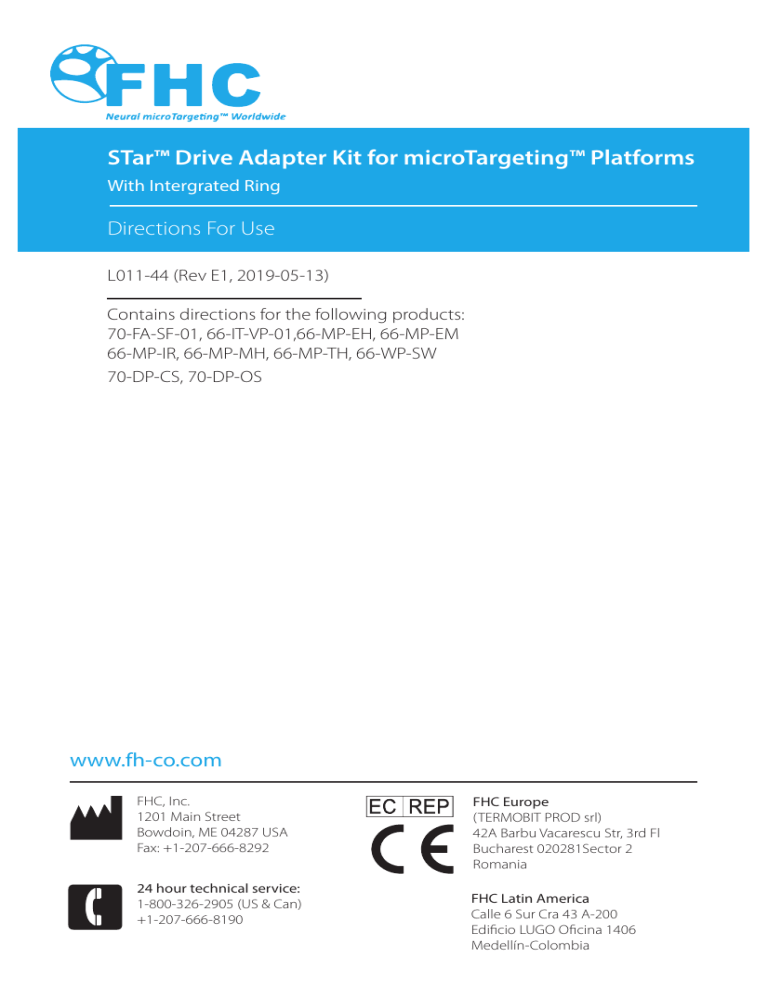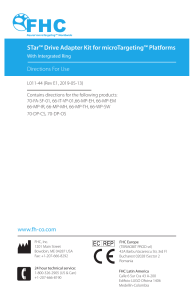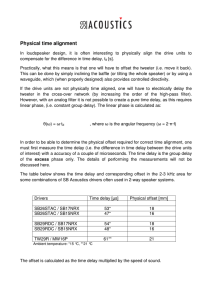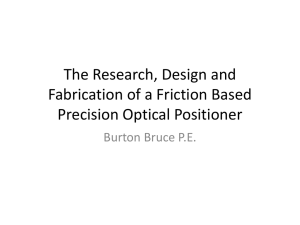
STar™ Drive Adapter Kit for microTargeting™ Platforms With Intergrated Ring Directions For Use L011-44 (Rev E1, 2019-05-13) Contains directions for the following products: 70-FA-SF-01, 66-IT-VP-01,66-MP-EH, 66-MP-EM 66-MP-IR, 66-MP-MH, 66-MP-TH, 66-WP-SW 70-DP-CS, 70-DP-OS www.fh-co.com FHC, Inc. 1201 Main Street Bowdoin, ME 04287 USA Fax: +1-207-666-8292 24 hour technical service: 1-800-326-2905 (US & Can) +1-207-666-8190 FHC Europe (TERMOBIT PROD srl) 42A Barbu Vacarescu Str, 3rd Fl Bucharest 020281Sector 2 Romania FHC Latin America Calle 6 Sur Cra 43 A-200 Edificio LUGO Oficina 1406 Medellín-Colombia Table of Contents Indications for use, Intended use, and Other devices required Symbol Key Inventory Cleaning and Sterilization Illustrative Procedure: Track Selection Track Offsetting Chart L011-44 Rev. E1 4 4 4 5-6 7 9 9 2019-05-13 Page 3 of 9 Indications for use STar™ Drive Platform Adapter Kit is intended to be used with commercially available stereotactic systems for neurosurgical procedures which require the accurate positioning of micrelectrodes, stimulation electrodes, or other instruments in the brain or nervous system. Intended use STar™ Drive Platform Adapter Kit is intended for use by a neurosurgeon in an operating room environment to position and move devices relative to a planned stereotactic system trajectory and target. Other devices required: • Compatible navigation software, such as WayPoint™ Navigator • Patient specific microTargeting™ Platform built using fiducial anchor locations and desired trajectory • Stereotactic device compatible with surgical kit positioners, such as microTargeting™ STar™ Drive Symbol Key WARNING / Caution, consult instructions for important cautionary information. Medical device manufacturer, as defined in EU Directives 90/385/EEC, 93/42/EEC and 98/79/EC. Consult the instructions for use. In reference to “Rx only” symbol; this applies to USA audiences only Telephone number Caution- Federal law (USA) restricts this device to sale by or on the order of a physician. Date when the medical device was manufactured Indicates the catalog number so that the medical device can be identified. Indicates the manufacturer’s batch code so that the batch or lot can be identified. Indicates the serial number so that a specific medical device can be identified. Indicates the use of Radio-Frequency Identification (RFID). Page 4 of 9 L011-44 Authorized Representative European Community in the European Conformity. This device fully complies with MDD Directive 93/42/ EEC and legal responsibilities as a manufacturer are with FHC, Inc., 1201 Main Street, Bowdoin, ME 04287 USA. An item that is known to pose hazards in all MRI environments. Rev. E1 2019-05-13 Inventory 1 2 3 4 5 6 16 1. 2. 3. 4. 5. 6. 7. 8. 9. 10. 11. 12. 13. 14. 15. 16. 15 14 13 A 12 11 10 9 8 7 6mm Target Offset Mounting Hub 66-MP-TH Standard Mounting Hub66-MP-MH Microtray for small parts SteriSuite Case67-00-7 Hex Wrench66-WP-HW Lead Measuring Fixture66-AC-MT-01 Entry Marking Tool66-MP-EM Standoff Wrench 66-WP-SW Manual Handle66-WP-DH Combination Bit66-WP-CD Burr hole Bushing66-MP-EM 3mm Entry Offset Mounting Hub 66-MP-EH Lead Holder70-CN-DB Center positioner70-DP-CS Offset Positioner70-DP-OS Verification Probe66-IT-VP-01 Purchased Separately A. STar™ Drive M/E (shown) or STar™ Drive M/A * or STar™ Drive sold in kits Various The products referenced in this document satisfy the FDA’s Unique Device Identification Direct Marking requirement though the use of Radio-Frequency Identification (RFID). The RF air protocol is compliant with ISO-18000-6C EPC Global Class 1 Generation 2, and operates at frequencies in the band of 902-928MHz (UHF). The Unique Device Identification number retrieved from the RFID can be used to access product information through the FDA’s Global Unique Device Identification Database (GUDID), which is available on the FDA’s website. L011-44 Rev. E1 2019-05-13 Page 5 of 9 Cleaning and Sterilization Manual Cleaning Protocol: (Requires STar™ SteriSuite) 1. Prepare the detergent according to manufacturer’s recommendations: Asepti Wash Plus liquid (2.5 ml per liter or 1/4 oz per gal), using warm tap water. 2. Separate the Drive, positioners, hubs, and Lead Holder and immerse them in the wash solution for a minmum of 5 minutes. Actuate the devices during the soak. 3. Using a clean soft cloth that has been soaked in the detergent, wipe the tray, and its insert, to remove any visible soil. Use a soft bristle brush and syringe to reach hard-to-clean areas. 4. Place the Drive and its components back in the tray. 5. Prepare the detergent in a sonication unit according to manufacturer’s recommendations: Asepti Wash Plus liquid (2.5 ml per liter or 1/4 oz per gal). 6. Immerse the tray in the sonication unit and sonicate for a minimumof 10 minutes. 7. Rinse all components with running reverse osmosis/de-ionized water to remove any residual detergent. 8. Dry components using a clean soft cloth. 9. Visually inspect to ensure all visible soil is removed. Automated Cleaning Protocol: (Requires STar™ SteriSuite) Phase Recirulation Time Water Temperature Ecolab Inc. Detergent (2.5 ml/l or 1/4 oz/gal) Ecolab Inc. Detergent (2.5 ml/l or 1/4 oz/gal) Pre-Wash 1 2:00 min Cold Tap Water (16°C max) N/A N/A Enzyme Wash 2:00 min Hot Tap Water (43°C min) Asepti Wash Plus Sekusept AR Wash 1 2:00 min 65.5°C (Set Point) Asepti Wash Plus Sekusept AR Rinse 1 2:00 min Heated Water (66.0°C) N/A N/A Pure Water Rinse 0:10 min Heated (66.0°C) Asepti Rinse Sekusept FNZ or Sekumatic Multiclean Dry 7:00 min 115°C N/A N/A Platform Adapter Kit Sterilization instructions: Protocol Method Steam Gravity wrapped: (in 2 Layers of 1-ply Polypropylene wrap [1]) Exposure Time: 30 minutes at 132°C (270°F) Minimum Dry Time: 60 minutes [1] Cycle was validated using Halyard Health H300 wrap Prevacuum wrapped: (in 2 Layers of 1-ply Polypropylene wrap [2]) Preconditioning Pulses: 3 Exposure Time: 4 minutes at 132°C (270°F) Minimum Dry Time: 60 minutes [2] Cycle was validated using Halyard Health H400 wrap Prevacuum wrapped: (in 2 Layers of 1-ply Polypropylene wrap [3]) Preconditioning Pulses: 3 Exposure Time: 18 minutes at 134°C (273°F) Minimum Dry Time: 60 minutes [3] Cycle was validated using Halyard Health H300 wrap User should be aware that the effects of unvalidated sterilization protocols could result in damage to the components and affect their functioning or performance. The STar™ Drive Adapter Kit is not validated for use with alternative sterilization protocols, and FHC does not recommend or endorse their use. Users with questions regarding this safety issue should contact FHC’s Technical Service Department at 1-207-666-8190. Page 6 of 9 L011-44 Rev. E1 2019-05-13 Illustrative Procedure 1. Attach and handtighten standoffs to anchors. a b 2. Attach platform to standoffs with thumbknobs. WARNING: Do not overtighten thumbknobs. Only turn an additional 1/4 turn after contacting mating surface. 3. Attach the center hub to the platform using 2 screws at 90 degrees apart. Make sure the hub is completely seated in the platform. The hub will sit approximately 1/8” above the top surface of the platform. b a 4. Use the burr hole entry marker with burr hole bushing and mark the skin and skull, then remove. a L011-44 b Rev. E1 c 2019-05-13 d Page 7 of 9 5. Remove platform and drill burr hole. 6. Reattach platform. 7. Attach center drive positioner to center hub with tab oriented 45°, 90°, or 135° relative to screw. Make sure positioner is completely seated in the hub. a b c 8. Attach drive to positioner and secure following drive instructions. 9. Perform MER and implant lead. 10. Remove drive from positioner, then remove platform. 11. Use the standoff wrench to support the standoff while twisting the driver clockwise to secure it to the standoff. Turn standoff wrench counterclockwise to remove standoff. a b c d 12. Use the anchor wrench to support the anchor while twisting the driver clockwise to secure it to the anchor. Turn anchor wrench counterclockwise to remove anchor. a b c d 13. Dispose of used anchors, Standoffs and thumbknobs according to hospital protocol. Page 8 of 9 L011-44 Rev. E1 2019-05-13 Track Selection Center positioner (9 distinct tracks): Center track on target. Four parallel tracks with 2mm offset, ‘+’ configuration, using positions A, C, E and G. Four parallel tracks with 2mm offset, ‘x’ configuration, using positions B, D, F and H. Examples: Center Positioner, ‘+’ configuration, using any of positions A, C, E or G, indicated by the black dots in the offsetting chart below. Center Positioner, ‘X’ configuration, using any of positions B, D, F or H, indicated by the red dots in the offsetting chart. 3mm offset positioner (40 distinct tracks): Five parallel tracks with 2mm offset, center track offset 3mm from origin, in eight configurations using positions A-H. Examples: 3mm Offset Positioner in the ‘B’ position, indicated by the magenta dots in the offsetting chart. 3mm Offset Positioner in the ‘G’ position, indicated by the dark blue dots in the offsetting chart. Offsets beyond the 10mm range of the positioner may be reached with the target offset hub. WARNING: The target offset hub creates a new trajectory with target area orthogonally offset 6mm from the original at the microelectrode tip depth when the physical drive reads 30mm. For platforms with T<>30, the offset of 0.69mm per 10mm of drive travel may be used to determine position at target depth. Track Offsetting Chart 3.5 3.0 2.12 2.0 1.41 1.0 .71 WARNING: The entry offset hub creates a new trajectory which is orthogonally offset 3mm from original at approximate entry depth, and coincides with the original at the microelectrode tip depth when the physical drive reads 30mm. For platforms with T<>30, the offset of 0.34mm per10mm of drive travel may be used to determine position at target depth. .71 1.0 1.41 2.0 2.12 3.0 Rev. E1 3.5 3.0 1.41 2.0 2.12 .71 1.0 2.12 2.0 1.41 1.0 .71 3.5 L011-44 3.0 3.5 2019-05-13 Page 9 of 9



